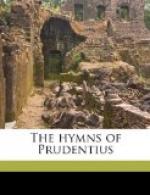69 This symbolism of the gifts of the Magi is
also found in Juvencus
(I. 250): “Frankincense,
gold and myrrh they bring as gifts to a
King, a Man and a God,”
and is again alluded to by Prudentius in
Apoth. 631 et
seq. The idea is expressed in the hymn of Jacopone
da Todi, beginning Verbum
caro factum est (Mone, Hymni Latini,
Vol. 2):
“Gold
to the kingly,
Incense
to the priestly,
Myrrh
to the mortal:”
and it has passed into the Office for Epiphany in the Roman Breviary: “There are three precious gifts which the Magi offered to their Lord that day, and they contain in themselves sacred mysteries: in the gold, that the power of a king may be displayed: in the frankincense, consider the great high priest: in the myrrh, the burial of the Lord” et passim.
172 The idea that Moses defeated the Amalekites
because his arms were
outstretched in the
form of a cross is found also in one of the hymns
(lxi.) of Gregory Nazianzen.
The symbol of the Christian religion,
the cross, “was
fancifully traced by the Fathers throughout the
universe: the four
points of the compass, the ’height, breadth,
length and depth’
of the Apostle expressed, or were expressed by,
the cross.... The
cross explained everything” (Maitland, Church
in
the Catacombs, p.
202).
193 The discomfiture of the heathen gods wrought
by the Incarnation
is elaborated by Milton,
whose lines recall this and similar passages
in Prudentius:—
“Peor, and Baaelim
Forsake their temples dim
* * * * *
And sullen Moloch fled,
Hath left in shadows dread,
His burning idol all of blackest hue.
Our Babe, to show his Godhead
true,
Can in his swaddling bands control the damned
crew.”
FINIS



